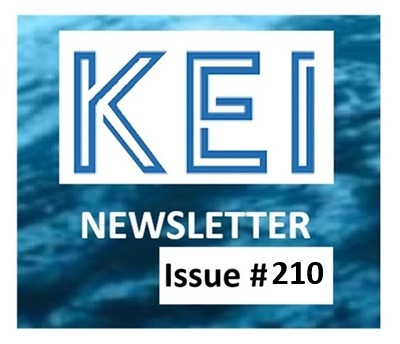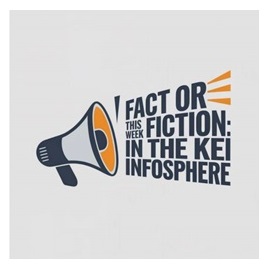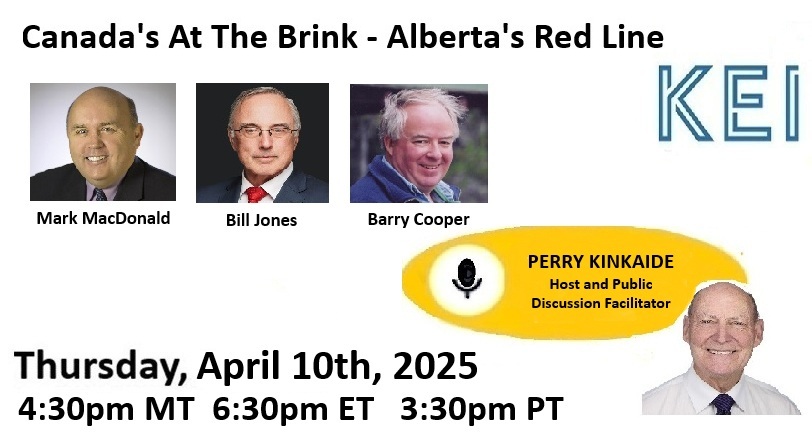|
Canada At The Brink - Alberta's Red Line |
DIRECTORY | ||
|
Contributions: How Serious Are the Economic Challenges Facing Canada - interview of Dr. Jack Mintz - webinar recording |
Action: Help sustain KEI's contributions |
Fact or Fiction?
Canada and Quebec Could Not Survive Without Alberta |
|
|
Editor - Perry Kinkaide |
Global tensions are reshaping alliances, and Canada is not immune. As the world contends with economic warfare, rising protectionism, and shifting power dynamics, domestic unity is also under strain. Alberta—long a pillar of Canada’s economic engine—is now drawing a red line. Premier Danielle Smith - with six non-negotiable demands on Ottawa, has signaled a serious shift in tone: from frustration to ultimatum. Is this the start of a national reckoning? KEI explores whether Canada can preserve unity in an age of growing regional assertiveness—or whether Alberta’s stance marks a turning point in Confederation’s future. Join the conversation. - Editor |
||
|
Canada at the Brink? To much of the world, Canada is seen as a cold yet peaceful country—undefended, resource-rich, and quietly nestled beside the most powerful and influential nation in history. But as Mahatma Gandhi once observed, “Nations have no permanent friends, only permanent interests.” For Canada, that interest has long been the preservation of its relationship with the United States—as both protector and commercial partner. Every day, five million barrels of oil flow south from Alberta through the world’s longest pipeline network, generating tens of billions of dollars for Canada annually. This vital exchange fuels not only the U.S. economy, but Canada’s stability as well. Yet, the global order is shifting. World War III, some argue, is already underway—in the Middle East, across Europe, in threatened pockets of Asia, and now in the economic arena where the United States has drawn lines against its own trading partners. Great powers are casting themselves as victims, wielding war and proxies, sanctions and tariffs, against adversaries. This global climate of confrontation extends inward. In Canada, tensions simmer between a central federal government with sweeping authority and its provinces, two of which—Quebec and Alberta—stand apart. Quebec defending its French heritage. Alberta defending its resource-based economy. History tells us that civil wars have erupted over less. Though Canada remains a peace-loving nation, the prospect of internal fracture cannot be entirely dismissed. The currents of nationalism, economic strain, and cultural preservation are strong—and in uncertain times, even the most stable federations can find themselves at the brink.
No Need to Register - Just Zoom in https://us02web.zoom.us/j/84258596166?pw.. A Red Line Has Been Drawn The topic of sovereignty and separation is not new in Canada. The province of Quebec has long been the poster child for secessionist sentiment, holding two referendums and nurturing a cultural and political identity distinct from the rest of the country. But Alberta—oil-rich, economically frustrated, and long at odds with Ottawa—now holds second place in the race for a resolution of unity. And, for the first time in its modern history, it may be on the edge of the exit ramp. Alberta Premier Danielle Smith, like premiers before her—Peter Lougheed, Ralph Klein, and Jason Kenney—has affirmed her commitment to Canada. All have fought, in their ways, for a stronger, fairer federation. Lougheed challenged the National Energy Program; Klein rejected calls to separate even when handed the so-called "Firewall Letter"; Kenney criticized federal overreach but firmly denounced separatism. Smith, too, has publicly stated "Canada first." But this time is different. Following Preston Manning’s recent warning that continued Liberal rule under Mark Carney could escalate Western alienation into something more permanent, Smith has drawn what some now call a “red line.” She has delivered to Ottawa a list of six non-negotiable demands—each one representing a flashpoint in the growing schism between Alberta and the federal government:
Smith has given Canada’s next Prime Minister—who will be elected later this month—six months to act. If Ottawa fails to meet the province halfway, what comes next could redraw Canada’s political map. The Premier has not explicitly used the word “separation.” But in interviews and statements, she has left the door open to a dramatic rethinking of Alberta's place in the federation. Options that once seemed radical—an appeal to the Supreme Court to assert a right to secede, a pan-Western referendum on sovereignty, even the unthinkable: negotiations with the United States—are now quietly circulating in political circles and rural coffee shops alike. “This isn’t about posturing,” said one senior provincial official on background. “This is about defining a future where Alberta isn’t constantly punished for powering the country’s economy.” Federal candidates across the political spectrum have responded with alarm and caution. Mark Carney, now leading the Liberal Party, warned that “unity cannot be held hostage to ultimatums,” while Conservative leader Pierre Poilievre offered more conciliatory language, pledging to “respect the West’s voice and restore fairness.” Jagmeet Singh of the NDP called Smith’s move “irresponsible brinkmanship.” Whether Smith’s red line is a negotiation tactic or a genuine threat, it has crystallized Alberta’s long-festering frustrations. For decades, the West has felt used for its resources, sidelined in decision-making, and misunderstood by the Laurentian elites of Toronto and Montreal. Now, the rest of Canada must decide: will it negotiate with Alberta as a province—or eventually, as a nation? Because this time, the last straw may have already landed. Know Thy New Neighbour - "Influence, when not wielded wisely, becomes imposition." On what the President of the United States dubbed “Liberation Day,” the world witnessed not the hand of diplomacy, but the fist of economic coercion. In an address that reverberated far beyond the Rose Garden, President Donald Trump announced sweeping tariffs, insisting that all nations now meet America “reciprocally” — or prepare for a recalibrated relationship. All nations, that is, except two: Canada and Mexico were targeted. The justification? Proximity and profit. A trade agreement already in place. But such a rationale only begins to touch on the complexities of being a neighbour to history’s most influential power. Let’s not mince words. American influence — culturally, militarily, economically — is unparalleled. Its decisions reach across borders, its rhetoric often becomes policy, and its political pivots ripple through global systems. When the U.S. speaks, the world listens. And when it acts, others brace themselves. President Trump’s “Liberation Day” address — with its flawed economics, revisionist history, and baffling arithmetic — marked a low point in recent international relations. This wasn’t a policy pivot. It was a wrecking ball. His celebration of 19th-century protectionism ignored the hard-earned gains of post-WWII cooperation that brought global prosperity — including for America. That is, the prosperity enabled the assembly of Welfare States capitalizing on the Peace Dividend financed by United States defense spending on it's own military industrial complex. Now, the very nation that helped craft the global trading order appears determined to dismantle it. The question for Canada, Mexico, and others is no longer how to influence American decisions — but how to limit their collateral damage. In doing so, we must look inward and outward: strengthening inter-regional ties, especially in the high-growth services sector, and re-imagining economic diplomacy on our own terms. Here in Canada, we know too well what it means to live beside an economic giant. Our trade, infrastructure, immigration, energy systems — even our daily news cycles — move in tandem with American currents. Yet in this dynamic, sovereignty is not a shield but a negotiation, continuously shaped by the volume and velocity of the neighbour’s voice. So, as the tone from Washington shifts yet again, we ask: How do we preserve mutual respect in an increasingly unilateral world? How do we ensure that closeness is not mistaken for compliance? That friendship does not mean forfeiture? At KEI Network, we view geopolitics through the lens of interdependence. Canada matters to the United States — not just economically, but strategically, as part of a collective defense and shared continental future. But this relationship cannot rest solely on the architecture of trade agreements. It must be rooted in something deeper: trust, respect, and shared stewardship of our North American destiny. As Canadians prepare to elect a new Prime Minister on Monday, April 28, we urge a forward-looking mandate — one that prioritizes rebuilding trust with our neighbour while asserting our unique value in the partnership. In the end, our most important trade agreement may not be a document signed in a boardroom — but the strength of the relationship at our shared border. Canada's Leadership - Shaping Our Future Within and Without Here are 10 questions we'll be exploring this week to report next week on how each candidate for PM in Canada might answer and how they differ. Please reply with edits and questions that you would propose. 1. National Unity & Leadership. How will you bridge growing regional divides and political polarization while restoring public trust in federal leadership and institution? 2. Economic Growth & Competitiveness. What is your plan to boost Canada’s productivity, innovation, and competitiveness in a global economy—while ensuring broad-based prosperity across generations and regions? Is this to include public service reform? 3. Affordability & Housing. Given rising costs of living and a national housing crisis, what immediate and long-term measures will you take to improve affordability and housing access for Canadians? 4. Energy Transition & Climate Resilience. How will you balance support for Canada’s traditional energy industries with the urgent need to transition to a low-carbon economy and prepare for climate-driven disasters? Is this to include advancing nuclear and anticipating fusion energy. 5. North American Relations & Trade. In light of growing trade tensions with the U.S., how will you protect Canada’s economic sovereignty and strategically position our nation within a potential Fortress North America framework? 6. Foreign Policy & Global Relevance. What role should Canada play in a shifting world order, and how will you defend democratic values while navigating complex relationships with the U.S., China, and other global powers? 7. National Security & Sovereignty. What steps will you take to protect Canada from foreign interference, strengthen cybersecurity, and ensure the integrity of our democratic institutions? 8. Healthcare & Mental Health. How will your government address ongoing healthcare system challenges, including long wait times, workforce shortages, and access to mental health care? Is this to include a review of MAID and innovations in preventative medicine? 9. Education & Workforce Preparedness. What federal actions will you take to ensure students and workers are prepared for the jobs of the future, especially in technology, trades, and clean energy sectors? Is this to include how advances in artificial intelligence are transforming the economy. 10. Indigenous Reconciliation & Social Equity. What concrete commitments will you make to advance Indigenous reconciliation and reduce systemic inequities in health, education, and economic opportunity?
|



